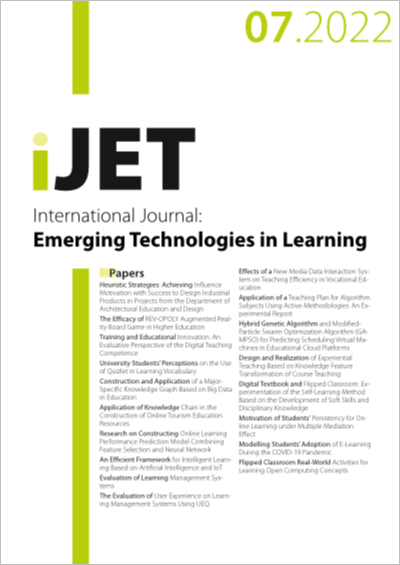Digital Textbook and Flipped Classroom: Experimentation of the Self-Learning Method Based on the Development of Soft Skills and Disciplinary Knowledge
DOI:
https://doi.org/10.3991/ijet.v17i07.28933Keywords:
digital textbook, flipped classroom, self-learning, soft skills, disciplinary knowledgeAbstract
Following adoption of the Moroccan educational system with a blended learning approach vis-à-vis the circumstances of the Covid-19 pandemic, which requires an adaptation on the part of the pedagogical actors to ensure pedagogical continuity and support students to guarantee their academic success. Our aim is to bring students to develop their own self-learning strategies to cope with the demands of the current situation through the use of a digital textbook in a flipped classroom. The sample consists of 362 students of which 54.14% are middle school students and 26.24% are male for the middle school and 23.2% in the high school. The digital textbook and the flipped classroom can improve the acquisition of disciplinary knowledge and obtain better results in students, and they can develop their soft skills. While there is a significant relationship between the development of soft skills in students and their academic success. The student ‘self-learning method using the digital textbook and the flipped classroom can help develop certain soft skills in the student. To conclude, our method remains effective and relevant, and does not replace face-to-face teaching, but is a complement for the teacher to improve his or her professional practices.
Downloads
Published
How to Cite
Issue
Section
License
Copyright (c) 2022 Kamal Moundy, Nadia Chafiq, Mohammed Talbi

This work is licensed under a Creative Commons Attribution 4.0 International License.



